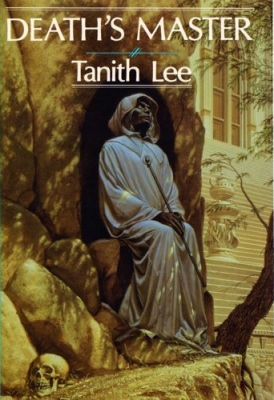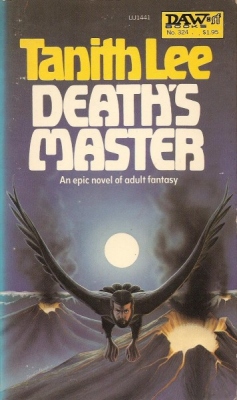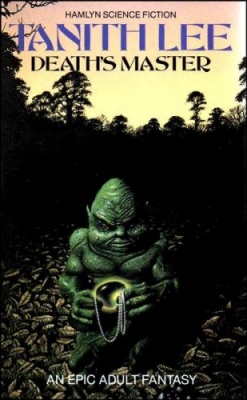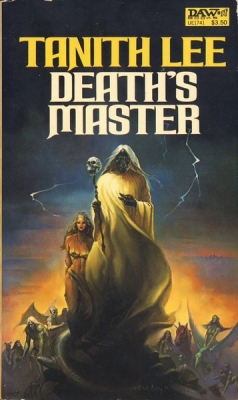The Golden Age of Science Fiction: Death’s Master, by Tanith Lee
In 1972, the British Fantasy Society began giving out the August Derleth Fantasy Awards for best novel as voted on by their members. In 1976. The name of the awards was changed to the British Fantasy Award, although the August Derleth Award was still the name for the Best Novel Award. From the award’s founding until 2011, the August Derleth Award was presented for Best Novel. In 2012, the Robert Holdstock Award for Best Fantasy Novel was created and the August Derleth Award became focused on Horror novels. The first August Derleth Award was presented to Michael Moorcock for The Knight of the Sword and Moorcock won four of the first five awards. The last August Derleth Award (before it became a Horror Award) was announced for Sam Stone for Demon Dance, but she declined the award. The category has remained part of the awards to the present day, although a re-alignment in 2012 means the awards are now selected by a jury rather than the full membership of the British Fantasy Society. In 1980, the awards were presented at Fantasycon VI in Birmingham.
Lee was the first woman to win the August Derleth Award. Although Sam Stone would win the award in 2011 for her novel Demon Dance, no other woman accepted the award until 2014, when Lauren Beukes won it for The Shining Girls. Catriona Ward has since won the award in 2016 for Rawblood. However, when Lee won the award, it was for Best Novel. In 2012, the August Derleth Award had a focal shift to Best Horror novel, with Fantasy novels winning the Robert Holdstock Award from that point on. As it happens, even if Lee had lost in 1980, that year’s award would have gone to a woman, as the other nominees were Phyllis Eisenstein and Patricia A. McKillip.
Death’s Master opens with a variation of the myth of the Fisher King. Narasen, the Queen of Merh is cursed that her country will wither until she has a child. Despite being a lesbian, Narasen attempts to have a child, which means she gains the reputation of being a harlot, until she makes a deal with Death to have the child of a dead man. The majority of the novel then follows that child, Summu, who succeeds Narasen when the queen is poisoned immediately after childbirth, although Lee also follows Narasen’s afterlife and her battles with Death.
Narasen’s assassin can’t kill the child, however, and while Narasen’s former captain of the guard takes over as ruler of Merh, Simmu is raised by a mixture of demons and priests. The child is gender fluid, able to become female or male, although Simmu is unaware of the ability from an early age and presents as male through much of childhood.
The other protagonist is Zhirem, whose mother manages to make him invulnerable to anything in the physical world. Zhirem and Simmu find each other in the temple and become friends, lovers, and mortal enemies.
The advertising for book described it as “an epic novel of adult fantasy,” which seems to mean that Lee is able to incorporate numerous sex scenes, both straight and gay. Published in the 1970s, the gender roles, even when fluid, as Simmu’s are, seems dated and binary, raising more questions about how this important feature of this novel would be handled in the modern day.

Lee’s novel tends to ramble between characters and subplots, piling them one upon the other, and making for a somewhat tedious slog through the sex, vengeance, demons, and retributions. Making the novel even more difficult is Lee’s conscious decision to use an almost gothic pseudo-archaic language throughout. Her decision to use obscure wording and complex sentence structure may serve to build the atmosphere of the novel, but to the detriment of the book’s pacing. The sheer number of stories Lee is telling are also hurt by the language she uses since none of them are fully able to get up to speed before she is focusing on another character’s tribulations.
Of course, Death’s Master is not only an August Derleth winner, but is also the second volume of Lee’s five volume Tales from the Flat Earth cycle. The first volume, Night’s Master, had previously been nominated for the World Fantasy Award for best novel, losing to Michael Moorcock’s Gloriana, and the final volume, Night’s Sorceries, a collection of novellas, was also nominated for the World Fantasy Award, losing out to Lucius Shepard’s The Jaguar Hunter, so it is clear that for all their faults, Lee’s dark world had an appear throughout the late 70s and 80s.
Lee faced Patricia McKillip’s Harper in the Wind and Phyllis Eisenstein’s Sorcerer’s Son in the balloting for the August Derleth Award.
 Steven H Silver is a sixteen-time Hugo Award nominee and was the publisher of the Hugo-nominated fanzine Argentus as well as the editor and publisher of ISFiC Press for 8 years. He has also edited books for DAW and NESFA Press. He began publishing short fiction in 2008 and his most recently published story is “Webinar: Web Sites” in The Tangled Web. Steven has chaired the first Midwest Construction, Windycon three times, and the SFWA Nebula Conference 6 times, as well as serving as the Event Coordinator for SFWA. He was programming chair for Chicon 2000 and Vice Chair of Chicon 7.
Steven H Silver is a sixteen-time Hugo Award nominee and was the publisher of the Hugo-nominated fanzine Argentus as well as the editor and publisher of ISFiC Press for 8 years. He has also edited books for DAW and NESFA Press. He began publishing short fiction in 2008 and his most recently published story is “Webinar: Web Sites” in The Tangled Web. Steven has chaired the first Midwest Construction, Windycon three times, and the SFWA Nebula Conference 6 times, as well as serving as the Event Coordinator for SFWA. He was programming chair for Chicon 2000 and Vice Chair of Chicon 7.



This book/series is one of the items I really should get around to someday. Thanks for telling what the book is about.
One of my all-time favorite series, which I reread last year and again enjoyed very, very much.
All due respect, Steven, I find your review to be waaaay off.
You said the book was “a somewhat tedious slog”. Absolutely not. It’s a mythic odyssey the likes of which are rarely seen outside of THE ARABIAN NIGHTS. There’s nothing “tedious” about DEATH’S MASTER–and using the word “slog” is an insult to a widely acknowledge masterpiece.
You also wrote: “Lee’s conscious decision to use an almost gothic pseudo-archaic language throughout.” IT’S CALLED GOOD WRITING, DUDE! She doesn’t use an archaic language–she uses functional modern English BUT WITH A LYRICAL AND POETIC SENSIBILITY THAT IS SORELY LACKING FROM MOST MODERN FANTASY.
Criticizing Tanith Lee for her evocative, lyrical, and compelling prose is like criticizing Monet for using “too much blue” in a painting.
I’m afraid my review of this review is TWO THUMBS DOWN.
And my review of DEATH’S MASTER is still: “A masterpiece of epic fantasy!”
John thanks for the counter argument. As I mentioned in previous comment I need to read this book, you have added much weight to me “getting on with it”.
Sadly I have really not read much Lee. To be honest the only book I actually recall reading was Companions on the Road, which is more a decent size short story. On the plus side I have the Books of Paradys /all four) buffering on my To Read shelf.
Heh. After reading the post I knew it was only a matter of time before Fultz kicked in the door.
Ha! You know me too well, Hocking!
That’s mah gurl, yo! 🙂
I am a stone Tanith Lee fan, just to let everyone know. But, I cannot fault Mr. Silver for finding Ms. Lee’s longer works to be a bit deliberately paced. The Flat Earth works that are episodic, like Night’s Master do seem to flow a bit easier and faster than the more unitary narratives like Death’s Master or Delirium’s Mistress. I would still recommend all of the Flat Earth works, but I would not be surprised to learn that the latter two were not as appealing as the other entries.
In what sense is “deliberate” pacing a negative? I suppose The Birthgrave is “deliberately” paced, but I think it’s brilliant. A good writer can make plenty happen – even when “nothing is happening.”
“Deliberate” or slow, stately prose requires a precise touch on the part of the author as well as a degree of patience on the part of the reader. So I can see why it is not as accessible as and more demanding than propulsive narratives, even as it is lyrical and poetic (to borrow Mr. Fultz’s terms).
Given the Biblical inspirations behind much of the Flat Earth series, it is the difference between the energetic incidents of Genesis and Exodus and the legal formulations of Leviticus or the ‘begats’ of Numbers.
This discussion reminds of those fantasy fans who won’t read LORD OF THE RINGS because it isn’t written in a modern-enough style for them. And then there are LOTR fans who won’t read THE SILMARILLION because it reads more like The Bible or ancient lore than LOTR. A writer can’t please everyone, he or she can only please himself. And by doing so, both Lee and Tolkien have gained legendary status but telling amazing tales of high fantasy (and in Tanith’s case also sci-fi and horror). The fact that both writer’s works are legendary speaks for itself. (Although I still like to chime in sometimes.)
“by telling” not “but telling”